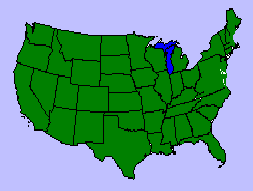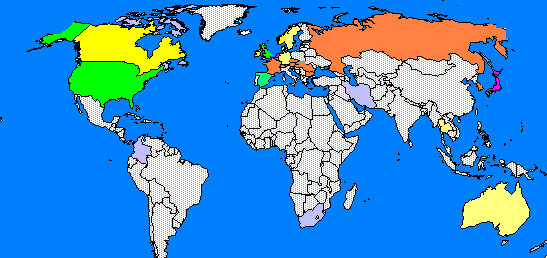|
What have been the latest developments in the stem cell controversy?
Political pressure to expand the level of government-funded stem cell research has increased amid ongoing reports of the potential medical efficacy of
such treatments. Congress passed legislation authorizing such expansion  but President Bush vetoed the legislation based his religious convictions. There is some indication from scientific advances of the
improved potential of non-embryonic stem cells. but President Bush vetoed the legislation based his religious convictions. There is some indication from scientific advances of the
improved potential of non-embryonic stem cells.
The medical possibilities which might result from stem cell research continues to excite the scientific community. There are some indications that
progress is being made in developing alternatives to the use of embryos in pursuing this technology. If this happens, most political/ethical concerns
regarding the matter will be resolved. The competitive aspects of this research were evidence by recent revelations that a South Korean scientist had faked
research that had purported replicated individual DNA.
The stem cell controversy is an issue in the 2008 Presidential campaign in part because of the recent death of former President Ronald Reagan from
Alzheimer's disease. Some of his family members have been vocal advocates of the potential of stem cell research to provide treatments for such conditions
and his son spoke at the Democratic convention on the subject. Recent polls indicate that the research proposals have widespread public support even among
Republican voters.  Voters in California recently
approved a ballot measure to establish a public funded stem cell research program in that state. As in past election years, the 2008 Democratic platform
supports funding this research. The 2008 Republican platform continues to reflect the party's religious based opposition to embryonic stem cell research.
There are indications that some European and Asian countries have the green light to actively pursue this research. Voters in California recently
approved a ballot measure to establish a public funded stem cell research program in that state. As in past election years, the 2008 Democratic platform
supports funding this research. The 2008 Republican platform continues to reflect the party's religious based opposition to embryonic stem cell research.
There are indications that some European and Asian countries have the green light to actively pursue this research.
On March 9, 2009, President Obama issued an executive order removing the restriction on federal funding for newer stem cell lines. Researchers are still
limited by budget language prohibiting federal funding for research involving destroyed or discarded embryos. But researchers can use federal funds on new
lines which had been created with private funds or state funding.
What are "stem cells"?
For purposes of the current controversy, these cells are known as "pluripotent stem cells". These are specialized cells which are formed at the very
beginning stages of human embryo development and are part of what is known as a blastocyst (see illustration). These cells are
unique because at this stage in development they are not specialized and have the capacity to develop into 130 different human tissue types.
Why are these stem cells important to medical scientists?
Although research is only in the early stages, there is a growing consensus among researchers that many very effective medical treatments can be
realized through cloning stem cells. This is because these cells can be made to replicate specific human tissues. These cells offer the possibility of a
renewable source of replacement cells and tissue to treat a myriad of diseases, conditions, and disabilities including Parkinson's and Alzheimer's diseases,
spinal cord injury, stroke, burns, heart disease, diabetes, osteoarthritis and rheumatoid arthritis. There is almost no realm of medicine that might not be
touched by this innovation.
How are stem cells obtained?
Current research projects have obtained stem cells from tissue which has been removed during terminated pregnancies or from embryos produced by in-
vitro fertilization clinics. Once isolated, the cells can be grown up in the laboratory and stored for future use. Each reservoir of cells, derived from a
single embryo, is known as a cell line. A more reliable supply would be obtained by copying or cloning embryos specifically for their stem cells.
What is the controversy?
The controversy involves federal funding of research involving stem cell lines made from destroyed or discarded embryos. There are no restrictions
regarding this research involving private funding except in a few states.  In addition, twelve states have provided funding for this research. In addition, twelve states have provided funding for this research. 
Because stem cells are obtained from destroyed embryos, the concerns are similar to those surrounding abortion. Most opponents of legal abortions also
oppose this research. In addition, the possibility that cell lines could be developed from cloned embryos raises ethical concerns associated with propriety
of human cloning. The most prominent global opponent of this research is the Catholic Church although many individual American Catholics do not take this
view.  (Click to see chart)
In fact the official Catholic position is also opposed to in vitro fertilization because it is unnatural and because it results in the production of embryos
which are not used. During President Bush's visit to Europe, the Pope urged the President not to support funding of this research. (Click to see chart)
In fact the official Catholic position is also opposed to in vitro fertilization because it is unnatural and because it results in the production of embryos
which are not used. During President Bush's visit to Europe, the Pope urged the President not to support funding of this research.
In a nationally televised speech on August 9, 2001, President Bush ended months of deliberation on the issue of federal funding of stem cell research.
He stated that the Administration will support continued funding for research on stem cell lines which have already been extracted. He stated that 65 cell
lines already exist which is sufficient for present research purposes. This had been a difficult issue for the Bush Administration because of a campaign
pledge to end such funding. The decision has produced a predictably mixed reaction from those advocating a total ban on such research. The Gallup Poll
following the decision was supportive  but also indicated that the
public had a limited understanding of the issue but also indicated that the
public had a limited understanding of the issue  . .
How will the decision impact U. S. research?
The decision will certain limit the number of government funded research projects but it has no effect on private stem cell research except that there
will be a continuing ban on the cloning of embryos for the purpose of extracting stem cells. Because this technology is so promising, it is likely that there
will be privately funded research. Because of the limitations, there is minimal funding for embryonic stem cell research although there is significant
funding of other types of research involving stem cells.  (Click to see chart) (Click to see chart)
Is there stem cell research that does not present such ethical dilemmas?
Yes. There is ongoing research involving adult stem cells as well as stem cells extracted from umbilical tissue. Already this research has resulted in
some effective experimental treatments for certain conditions. Some animal research suggests that techniques could be developed to make adult stem cells from
the same specialized tissues that embryonic stem cells do.
What are other countries doing?
In many countries, policies regarding stem cell research are only now being developed. The United States policy, which is primarily involved with the
issue of federal funding, is not overly restrictive when compared to many policies which do presently exist.  In February 2004, South Korean scientists reported that they had been successful in cloning human embryos for 30 days and then extracting stem cells.
Several months later it became apparent that this claim was fraudulent. This reported scientific advance was condemned by religious leaders and has renewed
the call for international regulation. Recently scientists in Japan and Great Britain have taken steps to pursue human cloning research as well.
In February 2004, South Korean scientists reported that they had been successful in cloning human embryos for 30 days and then extracting stem cells.
Several months later it became apparent that this claim was fraudulent. This reported scientific advance was condemned by religious leaders and has renewed
the call for international regulation. Recently scientists in Japan and Great Britain have taken steps to pursue human cloning research as well.
How do Democrats and Republicans stand on this issue?
As indicated by the Congressional votes, Democrats generally tend to support funding of this new technology for medical research purposes. The
Republican party is divided on this issue.
Stem Cell Links
Wikipedia: Stem Cell Controversy
Yahoo Topics: Stem Cells
National Institute of Health Stem Cell Page
Stem Cell Reports from National Academy
CRS Report on Stem Cell Issues, 2006
Kaiser Foundation on Stem Cell Research
Stem Cells - How Stuff Works
|

